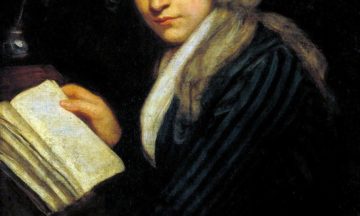Joanna Biggs at The Paris Review:
 A Vindication was written in six weeks. On January 3, 1792, the day she gave the last sheet to the printer, Wollstonecraft wrote to Roscoe: “I am dissatisfied with myself for not having done justice to the subject.—Do not suspect me of false modesty—I mean to say that had I allowed myself more time I could have written a better book, in every sense of the word.” Wollstonecraft isn’t in fact being coy: her book isn’t well-made. Her main arguments about education are at the back, the middle is a sarcastic roasting of male conduct-book writers in the style of her attack on Burke, and the parts about marriage and friendship are scattered throughout when they would have more impact in one place. There is a moralizing, bossy tone, noticeably when Wollstonecraft writes about the sorts of women she doesn’t like (flirts and rich women: take a deep breath). It ends with a plea to men, in a faux-religious style that doesn’t play to her strengths as a writer. In this, her book is like many landmark feminist books—The Second Sex, The Feminine Mystique—that are part essay, part argument, part memoir, held together by some force, it seems, that is attributable solely to its writer. It’s as if these books, to be written at all, have to be brought into being by autodidacts who don’t know for sure what they’re doing—just that they have to do it.
A Vindication was written in six weeks. On January 3, 1792, the day she gave the last sheet to the printer, Wollstonecraft wrote to Roscoe: “I am dissatisfied with myself for not having done justice to the subject.—Do not suspect me of false modesty—I mean to say that had I allowed myself more time I could have written a better book, in every sense of the word.” Wollstonecraft isn’t in fact being coy: her book isn’t well-made. Her main arguments about education are at the back, the middle is a sarcastic roasting of male conduct-book writers in the style of her attack on Burke, and the parts about marriage and friendship are scattered throughout when they would have more impact in one place. There is a moralizing, bossy tone, noticeably when Wollstonecraft writes about the sorts of women she doesn’t like (flirts and rich women: take a deep breath). It ends with a plea to men, in a faux-religious style that doesn’t play to her strengths as a writer. In this, her book is like many landmark feminist books—The Second Sex, The Feminine Mystique—that are part essay, part argument, part memoir, held together by some force, it seems, that is attributable solely to its writer. It’s as if these books, to be written at all, have to be brought into being by autodidacts who don’t know for sure what they’re doing—just that they have to do it.
more here.
